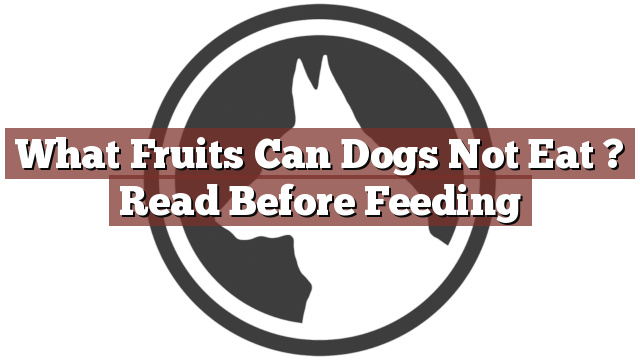Understanding Your Dog’s Dietary Needs
Proper nutrition is essential for the overall health and well-being of your furry friend. While dogs are primarily carnivorous animals, their diet can also include certain fruits and vegetables. However, it is important to note that not all fruits are safe for dogs to consume. As a responsible pet owner, it is crucial to understand your dog’s dietary needs and be aware of the fruits that should be avoided. By doing so, you can ensure that your canine companion maintains a balanced and healthy diet.
What Fruits Can Dogs Not Eat? Read Before Feeding
Before offering any fruits to your dog, you may wonder, "Can dogs eat grapes?", "Can dogs eat apples?", or "Can dogs eat bananas?". It is crucial to know which fruits are safe and which ones can potentially be harmful to your pup. Grapes and raisins, for example, can cause severe kidney damage and should never be given to dogs. Avocados contain a substance called persin, which can be toxic to canines. Other fruits to avoid include cherries, which can cause cyanide poisoning, and citrus fruits that may upset your dog’s stomach. On the other hand, many fruits are safe and can be a healthy addition to your dog’s diet, such as apples (without the seeds), bananas, and blueberries.
Pros and Cons of Feeding Fruits to Dogs
Feeding fruits to dogs can have both benefits and drawbacks. On the positive side, certain fruits provide valuable nutrients like vitamins, minerals, and antioxidants. They can be a good source of dietary fiber and contribute to your dog’s overall digestive health. Additionally, some fruits, such as apples and carrots, can help clean your dog’s teeth and freshen their breath. However, it is important to remember that fruits should only be given in moderation as excessive consumption can lead to digestive upset, including diarrhea or stomach discomfort. Moreover, some fruits may pose a choking hazard due to their size or pits, so it is crucial to remove any seeds or pits before offering them to your dog.
Conclusion: Making Informed Nutritional Choices for Your Canine Companion
In conclusion, understanding which fruits are safe for your dog to eat is essential in providing them with a healthy and balanced diet. While many fruits can be a nutritious addition to your dog’s meals or treats, it is crucial to be aware of the fruits that can be harmful to their health. Always avoid feeding your dog grapes, raisins, avocados, cherries, and citrus fruits. Instead, opt for safer alternatives such as apples (seedless), bananas, and blueberries. Remember to introduce new fruits gradually and in moderation to prevent any digestive issues. By making informed nutritional choices, you can ensure that your furry friend receives the best possible care and stays in optimal health.
Thank you for taking the time to read through our exploration of [page_title]. As every dog lover knows, our furry friends have unique dietary needs and responses, often varying from one canine to another. This is why it's paramount to approach any changes in their diet with caution and knowledge.
Before introducing any new treats or making alterations to your dog's diet based on our insights, it's crucial to consult with a veterinarian about [page_title]. Their expertise ensures that the choices you make are well-suited to your particular pet's health and well-being.
Even seemingly harmless foods can sometimes lead to allergic reactions or digestive issues, which is why monitoring your dog after introducing any new food item is essential.
The content provided here on [page_title] is crafted with care, thorough research, and a genuine love for dogs. Nevertheless, it serves as a general guideline and should not be considered a substitute for professional veterinary advice.
Always prioritize the expert insights of your veterinarian, and remember that the health and happiness of your furry companion come first.
May your journey with your pet continue to be filled with joy, love, and safe culinary adventures. Happy reading, and even happier snacking for your canine friend!

